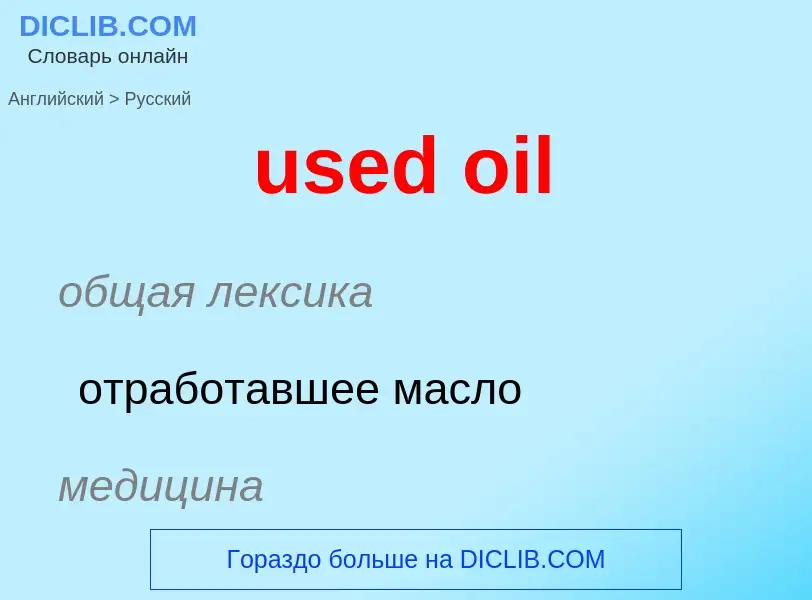Übersetzung und Analyse von Wörtern durch künstliche Intelligenz ChatGPT
Auf dieser Seite erhalten Sie eine detaillierte Analyse eines Wortes oder einer Phrase mithilfe der besten heute verfügbaren Technologie der künstlichen Intelligenz:
- wie das Wort verwendet wird
- Häufigkeit der Nutzung
- es wird häufiger in mündlicher oder schriftlicher Rede verwendet
- Wortübersetzungsoptionen
- Anwendungsbeispiele (mehrere Phrasen mit Übersetzung)
- Etymologie
used oil - Übersetzung nach russisch
общая лексика
отработавшее масло
медицина
отработанное масло
общая лексика
отработанное масло
нефтегазовая промышленность
отработавшее масло
Wikipedia

Petroleum, also known as crude oil, or simply oil, is a naturally occurring yellowish-black liquid mixture of mainly hydrocarbons, and is found in geological formations. The name petroleum covers both naturally occurring unprocessed crude oil and petroleum products that consist of refined crude oil. A fossil fuel, petroleum is formed when large quantities of dead organisms, mostly zooplankton and algae, are buried underneath sedimentary rock and subjected to both prolonged heat and pressure.
Petroleum is primarily recovered by oil drilling. Drilling is carried out after studies of structural geology, sedimentary basin analysis, and reservoir characterisation. Recent developments in technologies have also led to the exploitation of other unconventional reserves such as oil sands and oil shale.
Once extracted, oil is refined and separated, most easily by distillation, into innumerable products for direct use or use in manufacturing. Products include fuels such as gasoline (petrol), diesel, kerosene and jet fuel; asphalt and lubricants; chemical reagents used to make plastics; solvents, textiles, refrigerants, paint, synthetic rubber, fertilizers, pesticides, pharmaceuticals, and thousands of others. Petroleum is used in manufacturing a vast variety of materials essential for modern life, and it is estimated that the world consumes about 100 million barrels (16 million cubic metres) each day. Petroleum production can be extremely profitable and was critical to global economic development in the 20th century, with some countries, so-called "oil states", gaining significant economic and international power because of their control of oil production.
Petroleum exploitation and use have had significant negative environmental and social consequences. Extraction, refining and burning of petroleum fuels all release large quantities of greenhouse gases, so petroleum is one of the major contributors to climate change. Other negative environmental effects include oil spills, and air and water pollution. Some of these effects have direct and indirect health consequences for humans. Oil has also been a source of conflict, leading to both state-led-wars and other conflicts. Production of petroleum is estimated to reach peak oil before 2035 as global economies lower dependencies on petroleum as part of climate change mitigation and a transition towards renewable energy and electrification.


![Petroleum Exports by Country (2014) from [http://atlas.cid.harvard.edu/explore/tree_map/export/show/all/2709/2014/ Harvard Atlas of Economic Complexity].}} Petroleum Exports by Country (2014) from [http://atlas.cid.harvard.edu/explore/tree_map/export/show/all/2709/2014/ Harvard Atlas of Economic Complexity].}}](https://commons.wikimedia.org/wiki/Special:FilePath/2014 Petroleum Countries Export Treemap.png?width=200)
![Natural [[Bitumen]], commonly referred to as Asphalt Natural [[Bitumen]], commonly referred to as Asphalt](https://commons.wikimedia.org/wiki/Special:FilePath/Bitumen.jpg?width=200)



![Oil derrick in [[Okemah, Oklahoma]], 1922. Oil derrick in [[Okemah, Oklahoma]], 1922.](https://commons.wikimedia.org/wiki/Special:FilePath/Gusher Okemah OK 1922.jpg?width=200)
![Natural bottle of [[Whale oil]] Natural bottle of [[Whale oil]]](https://commons.wikimedia.org/wiki/Special:FilePath/Natural whale oil bottle.jpg?width=200)
![[[Octane]], a [[hydrocarbon]] found in petroleum. Lines represent [[single bond]]s; black spheres represent [[carbon]]; white spheres represent [[hydrogen]]. [[Octane]], a [[hydrocarbon]] found in petroleum. Lines represent [[single bond]]s; black spheres represent [[carbon]]; white spheres represent [[hydrogen]].](https://commons.wikimedia.org/wiki/Special:FilePath/Octane molecule 3D model.png?width=200)

![countries by oil production]] (information from 2006–2012).}} countries by oil production]] (information from 2006–2012).}}](https://commons.wikimedia.org/wiki/Special:FilePath/Oil producing countries map.png?width=200)
![This wartime propaganda poster promoted [[carpooling]] as a way to ration vital gasoline during [[World War II]]. This wartime propaganda poster promoted [[carpooling]] as a way to ration vital gasoline during [[World War II]].](https://commons.wikimedia.org/wiki/Special:FilePath/Ride with hitler.jpg?width=200)



